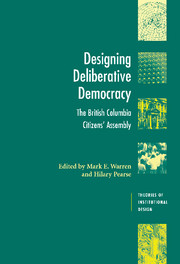Book contents
- Frontmatter
- Contents
- List of Tables
- List of Figures
- Contributors
- Preface
- Introduction: democratic renewal and deliberative democracy
- 1 Who should govern who governs? The role of citizens in reforming the electoral system
- 2 Citizen representatives
- 3 Institutional design and citizen deliberation
- 4 Agenda-setting in deliberative forums: expert influence and citizen autonomy in the British Columbia Citizens' Assembly
- 5 Descriptive representation in the British Columbia Citizens' Assembly
- 6 Do citizens' assemblies make reasoned choices?
- 7 Communicative rationality in the Citizens' Assembly and referendum processes
- 8 Deliberation, information, and trust: the British Columbia Citizens' Assembly as agenda setter
- Conclusion: the Citizens' Assembly model
- References
- Index
8 - Deliberation, information, and trust: the British Columbia Citizens' Assembly as agenda setter
Published online by Cambridge University Press: 22 September 2009
- Frontmatter
- Contents
- List of Tables
- List of Figures
- Contributors
- Preface
- Introduction: democratic renewal and deliberative democracy
- 1 Who should govern who governs? The role of citizens in reforming the electoral system
- 2 Citizen representatives
- 3 Institutional design and citizen deliberation
- 4 Agenda-setting in deliberative forums: expert influence and citizen autonomy in the British Columbia Citizens' Assembly
- 5 Descriptive representation in the British Columbia Citizens' Assembly
- 6 Do citizens' assemblies make reasoned choices?
- 7 Communicative rationality in the Citizens' Assembly and referendum processes
- 8 Deliberation, information, and trust: the British Columbia Citizens' Assembly as agenda setter
- Conclusion: the Citizens' Assembly model
- References
- Index
Summary
To Warren (1999: 311), “the generic problem [with] political relationships [is that they] throw the very conditions of trust into question.” Political choice can be cognitively very demanding, and voters may lack the capacity or the motivation to bear the cognitive burden. This is an argument for delegation. But the elites to whom political tasks are delegated will not automatically act as disinterested agents; they will pursue objectives of their own. Warren argues that deliberation potentially squares the circle by creating the circumstances for warranted trust. For ordinary citizens, however, the price of deliberation is usually too high. This is where the BC Citizens' Assembly on Electoral Reform (CA) comes in. To the extent that choice of delegates was truly by lot, the CA represented the BC electorate as a whole. It comprised “ordinary” British Columbians. Its proceedings were highly deliberative and the deliberation was both informed and sensitive to potential conflicts of interest. The Citizens' Assembly may be the harbinger of a new direction in political creativity.
But the final choice on electoral reform for BC rested with the electorate at large in a referendum. Can deliberation be of any relevance to the world of referenda? In two ways, referenda may be said to fail the test from the start.
- Type
- Chapter
- Information
- Designing Deliberative DemocracyThe British Columbia Citizens' Assembly, pp. 166 - 191Publisher: Cambridge University PressPrint publication year: 2008
- 29
- Cited by



